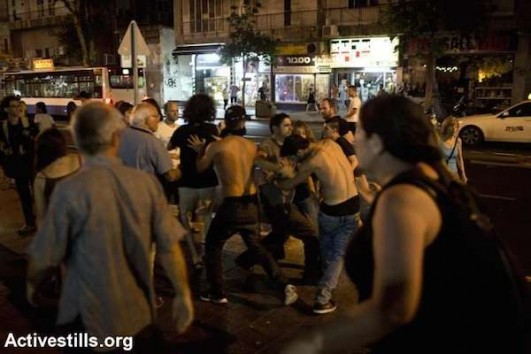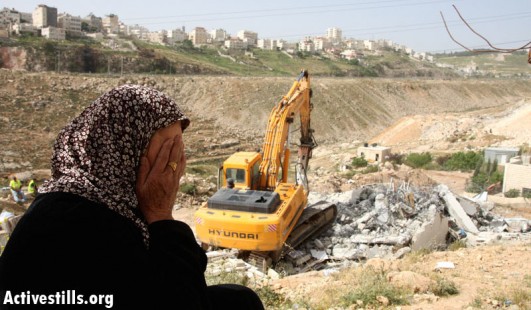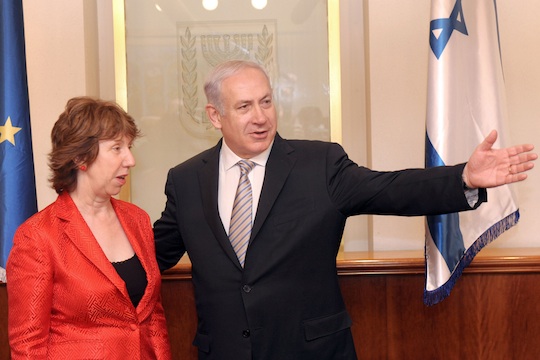An Israeli academic makes the case for Europe to contain Israel’s settlement policy with greater determination and more concrete measures.
By Nurit Peled-Elhanan
Times are very tough for both Israeli and Palestinian families. The death toll in Gaza currently stands at more than 1,000, the majority of whom are civilians. The death toll in Israel stands at 43, three of whom are civilians. Three Israeli teenagers were kidnapped and murdered in the West Bank. A Palestinian youth from Jerusalem was burned alive by Jewish extremists. Dangerous and violent racism against Arab-Israeli citizens encouraged by Israeli ministers and parliament members has led to street riots, bred aggression and severe discrimination against Palestinians, along with a new aggression against peace activists.
Israel is currently suffering from an unprecedented social and economic crisis. The single source for this crisis is Israel’s destructive occupation. The occupation has raised two generations of Palestinians as prisoners, jailed between military checkpoints and walls. The two generations of Israelis who believe that they are the lords of the land are nurtured by the illusion that the oppression of 4.5 million Palestinians gives them security and peace, and that such an oppressive society is capable of raising compassionate children. Therefore, they are shocked when their boys become ruthless killers, as is revealed by current events.

One of the most dominant and disastrous expressions of the occupation is the settlement project in East Jerusalem and the West Bank, which is illegal under international law. The settlements allow Israel to take control of Palestinians’ natural resources – in violation of international law – to strengthen its presence in the territories and to make the occupation irreversible. Despite various agreements, international resolutions and Israeli promises, the settlements are expanding.
All the while, Palestinian homes in East Jerusalem and so-called Area C (61% of the West Bank, under full Israeli control) are constantly destroyed. While water flows in the settlements without limitation, Palestinian villages live under a cruel water regime, as was recently pointed out by the president of the European Parliament, Martin Schulz, during a speech he gave before the Israeli parliament. Many roads are closed to Palestinians and the restriction of movement is unbearable.
To this day, the international community has not done enough to stop Israeli settlements. European countries have profoundly criticized them, while continuing to cooperate fully with Israel economically, politically and militarily. As a result, Israel does not pay any price for seriously violating international law. On the contrary, Europe also pays for much of the humanitarian damage of the occupation, making it even easier for Israel to maintain.

A year ago, the EU made a small step in the right direction: guidelines were issued prohibiting EU institutions to fund or to finance research organizations and activities in the settlements. Twenty European countries have published formal warnings to their citizens and companies regarding trade and financial relations with the settlements.
And yet, these measures do not seriously challenge Israeli policy in occupied Palestine. Europe could do much better, as illustrated by its harsh response to Russia’s annexation of Crimea. It took the EU a few weeks, not years, to make its stance against Russian actions crystal clear. Just this week the EU took a further bold step in suspending the funding of new public-sector projects in Russia by the EU’s lending institution, the European Investment Bank. This is in addition to the previous decision to ban the import of Crimean goods and to impose targeted sanctions on both Russian and Ukrainian officials and on business firms operating in Crimea. This all occurred, of course, well before the Malaysian passenger jet was shot down just this week.
Israel controls millions of Palestinians under an ongoing military occupation, claiming that this situation is “temporary.” However, a military occupation of 47 years, which includes the establishment of settlements, cannot be described as “temporary.”
As an Israeli longing for peace and justice, I believe Europe has to contain the settlement policy with greater determination and more concrete measures. The world increasingly understands the threat that the settlements pose to peace and stability in the region. Over time, neither Palestinians nor Israelis can survive without freedom and independence for the Palestinians. Already, the undemocratic character of the state of Israel is increasingly transforming it into an apartheid state.
For the two nations living in this region, there is a joint and real interest in ending the Israeli occupation as a precondition for peace. We, the citizens of Israel and the stateless people of Palestine, cannot bring this about on our own. We need the help of the international community at large and of the EU in particular.
As a laureate of the European Parliament’s Sakharov Prize for Human Rights, and as a mother and a human being, I call on the EU to use all the diplomatic and economic tools at its disposal to help save my country from the abyss of eternal occupation and injustice.
Professor Nurit Peled-Elhanan is a professor at the Hebrew University of Jerusalem, the 2001 Sakharov Prize Laureate, and the co-founder of the Russell Tribunal on Palestine.
Related:
When reality becomes hate speech: President of EU Parliament visits Israel
By refusing to drastically amend its settlement guidelines, EU reopens debate on occupation within Israeli elites
How will the EU elections affect Israel-Palestine?


